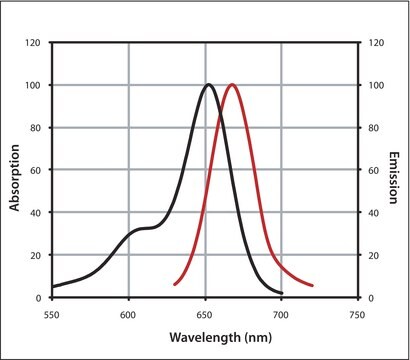07679
Abberior® STAR 635P, NHS ester
suitable for fluorescence
Faça loginpara ver os preços organizacionais e de contrato
About This Item
Código UNSPSC:
12352108
NACRES:
NA.32
Produtos recomendados
peso molecular
Mw 1030 g/mol
Nível de qualidade
solubilidade
DMF: 0.25 mg/mL, clear
fluorescência
λex 634 nm; λem 654 nm±10 nm in PBS, pH 7.4
adequação
suitable for fluorescence
temperatura de armazenamento
−20°C
Descrição geral
Abberior STAR635P is the first member of an entirely new class of dyes introduced exclusively by Abberior - first commercially available phosphorylated fluorescent dye. The dye excels in its photophysical parameters, e.g. very bright, very stable and it enables basically background free imaging.
Abberior STAR 635P can substitute Atto™ 647N, AlexaFluor 647, or Cy5. It can be excited with diode lasers (635 nm, 650 nm) or with the 647 nm line of a Krypton laser. For STED, a depletion wavelength of 750 - 780 nm is recommended. Please see reference1 for detailled characteristics.
Best results are obtained with freshly prepared samples.
Abberior STAR 635P particularly well suits the Leica TCS STED system and delivers high-resolution STED images with unmatched quality, e.g. extremely low/no background. The dye serves as an ideal partner for several 2-color STED.
Key Features
Absorption Maximum, λmax: 638 nm (PBS, pH 7.4)
Extinction Coefficient, ε(λmax): 120′000 M-1cm-1 (PBS, pH 7.4)
Correction Factor, CF260 = ε260/εmax: 0.21 (PBS, pH 7.4)
Correction Factor, CF280 = ε280/εmax: 0.40 (PBS, pH 7.4)
Fluorescence Maximum, λfl: 651 nm (PBS, pH 7.4)
Recommended STED Wavelength, λSTED: 750 - 780 nm
Fluorescence Quantum Yield, η: 0.90 (PBS, pH 7.4)
Fluorescence Lifetime, τ: 3.3 ns (PBS, pH 7.4)
Abberior STAR 635P can substitute Atto™ 647N, AlexaFluor 647, or Cy5. It can be excited with diode lasers (635 nm, 650 nm) or with the 647 nm line of a Krypton laser. For STED, a depletion wavelength of 750 - 780 nm is recommended. Please see reference1 for detailled characteristics.
Best results are obtained with freshly prepared samples.
Abberior STAR 635P particularly well suits the Leica TCS STED system and delivers high-resolution STED images with unmatched quality, e.g. extremely low/no background. The dye serves as an ideal partner for several 2-color STED.
Key Features
- First phosphorylated dye
- Unmatched, background free STED imaging contrast
- Verified in the Leica STED system
Absorption Maximum, λmax: 638 nm (PBS, pH 7.4)
Extinction Coefficient, ε(λmax): 120′000 M-1cm-1 (PBS, pH 7.4)
Correction Factor, CF260 = ε260/εmax: 0.21 (PBS, pH 7.4)
Correction Factor, CF280 = ε280/εmax: 0.40 (PBS, pH 7.4)
Fluorescence Maximum, λfl: 651 nm (PBS, pH 7.4)
Recommended STED Wavelength, λSTED: 750 - 780 nm
Fluorescence Quantum Yield, η: 0.90 (PBS, pH 7.4)
Fluorescence Lifetime, τ: 3.3 ns (PBS, pH 7.4)
Adequação
Designed and tested for fluorescent super-resolution microscopy
Outras notas
Informações legais
Atto is a trademark of Atto-Tec GmbH
abberior is a registered trademark of Abberior GmbH
produto relacionado
Nº do produto
Descrição
Preços
Código de classe de armazenamento
11 - Combustible Solids
Classe de risco de água (WGK)
WGK 3
Ponto de fulgor (°F)
Not applicable
Ponto de fulgor (°C)
Not applicable
Escolha uma das versões mais recentes:
Já possui este produto?
Encontre a documentação dos produtos que você adquiriu recentemente na biblioteca de documentos.
Os clientes também visualizaram
Sören Brandenburg et al.
Frontiers in physiology, 9, 1227-1227 (2018-10-24)
Rationale: Recently, abundant axial tubule (AT) membrane structures were identified deep inside atrial myocytes (AMs). Upon excitation, ATs rapidly activate intracellular Ca2+ release and sarcomeric contraction through extensive AT junctions, a cell-specific atrial mechanism. While AT junctions with the sarcoplasmic
Nossa equipe de cientistas tem experiência em todas as áreas de pesquisa, incluindo Life Sciences, ciência de materiais, síntese química, cromatografia, química analítica e muitas outras.
Entre em contato com a assistência técnica

